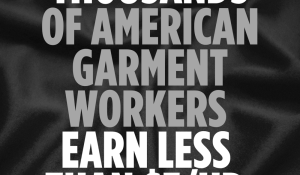
As we work toward Drawdown, it’s critical to address the impacts of climate change in communities of color, which are often hit “first and worst.” Jacqui Patterson, director of the NAACP’s Environmental and Climate Justice program, says we all need to work toward energy justice for everyone in our communities.
People often ask why the NAACP, a civil rights organization, is working on energy. All they would have to do is visit the communities with whom I work every day to know why energy is one of the most universally impactful civil rights issues of our time.
We see energy as a civil rights issue when nationwide, 78 percent of African-American children live near a coal plant—with their emissions of mercury, arsenic, lead, sulfur dioxide, nitrogen oxide, and particulate matter. African-American children are three to five times more likely than white children to visit an emergency room due to an asthma attack and two to three times more likely to die of an asthma attack.
We see energy as a civil rights issue when the oil industry has numerous disasters from oil drilling from Exxon Valdez to the BP oil drilling disaster in the Gulf of Mexico. A couple of years ago there was an explosion of an oil train, which obliterated a section of a town in Quebec to such an extent that remains of several of the residents were never recovered as they were completely incinerated.
We see energy as civil rights issue when African-American communities and others put so much into their electricity bills but get so little out of it, with the chief output being the disproportionate pollution burden.
According to the American Association of Blacks in Energy, African Americans spend on average $41 billion on energy, yet only hold 1.1 percent of energy jobs and gain less than .01 percent of the revenue from the energy sector. On average, African Americans also pay a higher proportion of their income on energy than the general population.
Meanwhile, the fossil-fuel industry uses its profits gained from the bills we pay to fight against safeguards for public health and well-being, with recent examples being suing the EPA for the Mercury and Air Toxics Rule and Clean Power Plan under the Clean Air Act, and Haliburton lobbying for an exemption for its fracking practices from the Safe Drinking Water Act.
When the fossil-fuel industry is using the very profits from the $41 billion in extraction from our communities to then suppress the advancement of policies that safeguard and protect the very health and well-being of our communities, we see distributed generation of energy as an issue of democracy.
We as the NAACP have determined that it is critical that we shift away from an industry that is responsible for so much harm and transition to an energy-efficient, clean energy economy. We see this not only as a way to have clean air, clean water, and healthier communities, but we also see this as being intersectional with our economic justice and democracy agendas. We can build individual or community wealth through co-ownership of our energy infrastructure, as well as introduce new job/business opportunities for communities whose previous relationship was largely extraction of income and receiving pollution in return.
For the African-American community alone, combined with strong institutions, savvy business entrepreneurs, skilled workers, promising students and more, not to mention untapped Latino, Indigenous, and Asian-American communities, the potential is vast, if we work smartly together! To that end, the NAACP recently launched Power to the People, a new campaign aimed at “fueling the revolution for energy justice.”
“Energy justice is about ensuring our communities benefit fully from green jobs, clean air, and an energy-independent future,” says Jo Ann Hardesty, president of the NAACP’s branch in Portland.
The national campaign uplifts the work of the state and local branches of the NAACP who are fighting as frontline communities who are hit first and worst with energy injustice. Already, communities from Fairbanks, AK, to Alachua County, FL, are launching community solar projects. Communities in Maryland and Ohio are engaging in Community Energy Purchase Agreements. In Mississippi communities are working on democratizing their rural electric co-ops and increasing focus on energy efficiency and clean energy.
In the coming days and weeks, the NAACP will be releasing its Just Energy Policies Toolkit, hosting an Energy Justice Training in conjunction with the EPA Hearings on the Clean Power Plan, as well as hosting a Black Labor Convening on Energy Justice—all with an aim of strengthening and supporting local leadership in advancing a just and sustainable energy landscape rooted in principles of economic justice and true democracy.
To learn more about this work, visit our campaign, Power to the People.
Jacqui Patterson is the director of environmental and climate justice at the NAACP.







